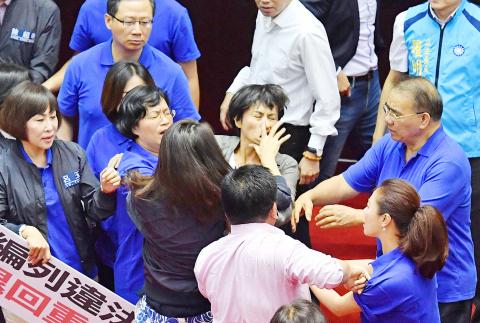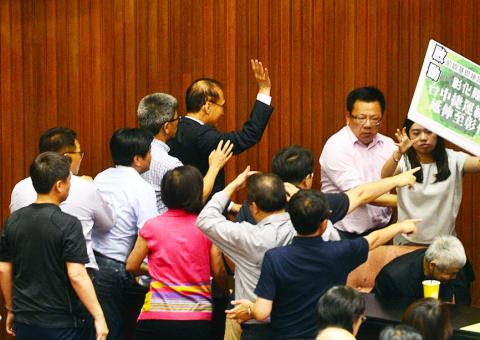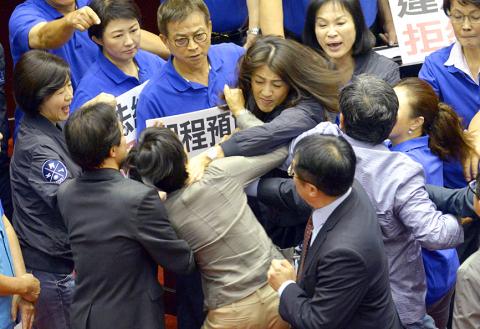Scuffles broke out at the legislature yesterday before Premier Lin Chuan (林全) was scheduled to brief legislators on the budget for the Forward-looking Infrastructure Development Program.
In one of the more dramatic moments Chinese Nationalist Party (KMT) Legislator Hsu Shu-hua (許淑華) slapped Democratic Progressive Party (DPP) Legislator Chiu Yi-ying (邱議瑩) across the face.
Legislators in the morning signed up to speak about the program during a legislative discussion preceding the first meeting of the second extraordinary legislative session, which began yesterday.

Photo: CNA
KMT secretary-general Lin Wei-chou (林為洲), the last KMT legislator to speak, gave KMT legislators a cue and they flocked to the front of the chamber to occupy the podium where Lin Chuan was scheduled to make his presentation.
Sounding air horns, blowing whistles and brandishing placards, KMT legislators said that the program, which has a budget of NT$420 billion (US$13.82 billion), would cause future generations to be mired in debt.
“Illegal budgeting. Block the review. Money-blowing premier. Lin Chuan step down,” they shouted.

Photo: Wang Yi-sung, Taipei Times
Legislative Speaker Su Jia-chyuan (蘇嘉全) tried to quell the protest by admonishing the KMT legislators, but his efforts were in vain.
A skirmish broke out between Chiu and Hsu when Chiu approached the KMT legislators and began pulling at a microphone that KMT caucus vice secretary-general Lee Yen-hsiu (李彥秀) was holding.
Hsu — in an apparent attempt to separate the two — joined the fray and soon became entangled with Chiu.

Photo: Sam Yeh, AFP
Hsu slapped Chiu across the face. Chiu responded by pulling her hair.
The two were separated by their colleagues, but that did not stop Chiu from scuffling with other KMT legislators, including Lee, KMT caucus whip Lin Te-fu (林德福) and KMT Legislator Huang Chao-shun (黃昭順).
The KMT caucus formed a blockade around the podium, but Su attempted to let Lin Chuan make the presentation nonetheless, prompting KMT lawmakers start throwing brochures, water balloons and fake banknotes in the premier’s direction.
Seeing that the proceedings had been paralyzed, Su advised the premier to leave, before announcing that the meeting would be reconvened today.
Hsu later said that her actions were meant to protect Lee and were inadvertent, and that she would like to apologize to society.
She said that she would be mindful of her interactions with her DPP colleagues from now on, but refused to apologize to Chiu, who she said had acted in a “provocative” manner.
The KMT’s “barbaric” boycott “belittled the legislature and bullied Taiwan,” Chiu said on Facebook.
Following a halt in the proceedings, Su in the afternoon session hastily put the DPP’s proposed agenda to a vote, which secured the majority backing of the DPP caucus.
The issues to be discussed during the extraordinary session included the Cabinet’s budget proposals for projects under the Forward-looking Infrastructure Development Program and a proposed amendment to the Mining Act (礦業法).

SECURITY: As China is ‘reshaping’ Hong Kong’s population, Taiwan must raise the eligibility threshold for applications from Hong Kongers, Chiu Chui-cheng said When Hong Kong and Macau citizens apply for residency in Taiwan, it would be under a new category that includes a “national security observation period,” Mainland Affairs Council (MAC) Minister Chiu Chui-cheng (邱垂正) said yesterday. President William Lai (賴清德) on March 13 announced 17 strategies to counter China’s aggression toward Taiwan, including incorporating national security considerations into the review process for residency applications from Hong Kong and Macau citizens. The situation in Hong Kong is constantly changing, Chiu said to media yesterday on the sidelines of the Taipei Technology Run hosted by the Taipei Neihu Technology Park Development Association. With

A US Marine Corps regiment equipped with Naval Strike Missiles (NSM) is set to participate in the upcoming Balikatan 25 exercise in the Luzon Strait, marking the system’s first-ever deployment in the Philippines. US and Philippine officials have separately confirmed that the Navy Marine Expeditionary Ship Interdiction System (NMESIS) — the mobile launch platform for the Naval Strike Missile — would take part in the joint exercise. The missiles are being deployed to “a strategic first island chain chokepoint” in the waters between Taiwan proper and the Philippines, US-based Naval News reported. “The Luzon Strait and Bashi Channel represent a critical access

CARROT AND STICK: While unrelenting in its military threats, China attracted nearly 40,000 Taiwanese to over 400 business events last year Nearly 40,000 Taiwanese last year joined industry events in China, such as conferences and trade fairs, supported by the Chinese government, a study showed yesterday, as Beijing ramps up a charm offensive toward Taipei alongside military pressure. China has long taken a carrot-and-stick approach to Taiwan, threatening it with the prospect of military action while reaching out to those it believes are amenable to Beijing’s point of view. Taiwanese security officials are wary of what they see as Beijing’s influence campaigns to sway public opinion after Taipei and Beijing gradually resumed travel links halted by the COVID-19 pandemic, but the scale of

Pope Francis is be laid to rest on Saturday after lying in state for three days in St Peter’s Basilica, where the faithful are expected to flock to pay their respects to history’s first Latin American pontiff. The cardinals met yesterday in the Vatican’s synod hall to chart the next steps before a conclave begins to choose Francis’ successor, as condolences poured in from around the world. According to current norms, the conclave must begin between May 5 and 10. The cardinals set the funeral for Saturday at 10am in St Peter’s Square, to be celebrated by the dean of the College